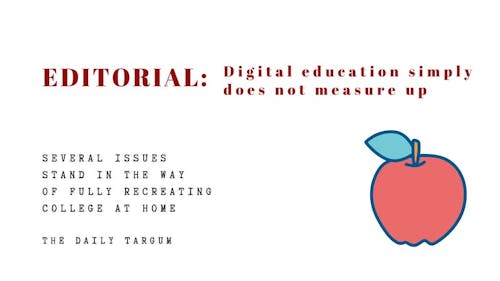EDITORIAL: Digital education simply does not measure up

Many students are scrambling — much like their professors — to adapt to this virtual learning environment we have been abruptly tossed into.
For some, this may be an easy, or perhaps even welcome, transition. That is dependent on several factors.
The first factor, which cannot be understated, is the home-life of students who have transitioned back to their familial residences. Many students have chaotic homes, filled with family members who have also been forced to work or attend school remotely.
This puts a strain on internet capabilities as well, which further dampens the educational potential of these online courses.
Additionally, many students use college as an escape from poor home-lives. Students with overbearing or abusive parents have now found themselves dealing with the burdens of college courses, work and familial fracturing simultaneously, which leads to an untold amount of stress.
Students living in different time zones are dealing with a unique issue: classes happening while they are supposed to be sleeping. If an online class is in session during daylight hours in New Jersey, that same course is occurring in the middle of the night for someone halfway across the world. Due to the truth that Rutgers students are not, in fact, owls, that will harm the portion of our student body who have moved home overseas for this shutdown.
Another factor to look at is the adaptability of professors. This is not to blame professors for this academic crisis, but it is true that many of them are not tech-savvy enough to endure this period swimmingly. Much like students, they have been thrown into the flames of digital learning. While it is not their fault, their inability to create adequate online content hampers our learning potential.
But the largest factor, when analyzing individual students, is the major they have chosen to partake in. Some majors are far less compatible with online interaction than others.
Lecture-based majors, which are mainly seen in analytical fields of study, are easier to convert to online platforms. For instance, a professor could simply record their spiel for the day and post it on their website for students to access at their leisure. For lecturers that use slideshows, they could post the slideshow online (which was already a common practice prior to this crisis).
But, the arts do not fare as well. Visual majors involving artistic expression are impossible to fully translate to an online platform, as professors and other evaluators need to be physically present to accurately and insightfully analyze a piece of work.
Art majors are also often more reliant on infrastructure that can only be accessed at Rutgers itself and cannot be adequately recreated at home. For instance, a music major may not have access to the right production or instrumental tools and services while working from home. A film major now has difficulty acquiring the resources they need to adequately create their work, which will inevitably lead to hampered grades or, at the very least, a weaker educational experience.
This can be broadened a bit as well. One thing that applies to all Rutgers students now is the lack of access to a library and nonguaranteed access to the internet. Students rely on the library as a quiet space with the necessary elements to complete just about any assignment, as well as textbooks and other written resources.
An important thing to note, though, is that this is not the fault of the librarians. Instead, the blame can be placed on the administrators, who pressured librarians to work despite the health concerns coronavirus disease (as well as poor planning) posed.
"(AAUP-AFT President Todd) Wolfson and (URA-AFT President Christine) O’Connell said the limited access to testing, the inability to enforce quarantines, the absence of an official treatment or vaccine as well as the threat of New Jersey hospitals becoming overloaded with cases means library employees who become infected may not have access to healthcare, putting them at risk," according to The Daily Targum.
Students now working at home also do not have the assurance of the internet. Rutgers has free wifi for its students, which is a great thing, but those now home, who have become reliant on that service, may find themselves with poorer or even no connection, rendering their digital academic pursuits futile.
When those vital University services are stripped away, so is some of the value of our tuition money. As we outlined in our past editorial, students are not solely paying the University for grades, but for the entirety of the college experience and infrastructure.
That infrastructure has been whittled or outright shut down. We now rely on ourselves for internet and educational resources that otherwise would have been at our disposal.
The University has an obligation to refund students in part for the college experience we are now subject to.
The Daily Targum's editorials represent the views of the majority of the 152nd editorial board. Columns, cartoons and letters do not necessarily reflect the views of the Targum Publishing Company or its staff.



